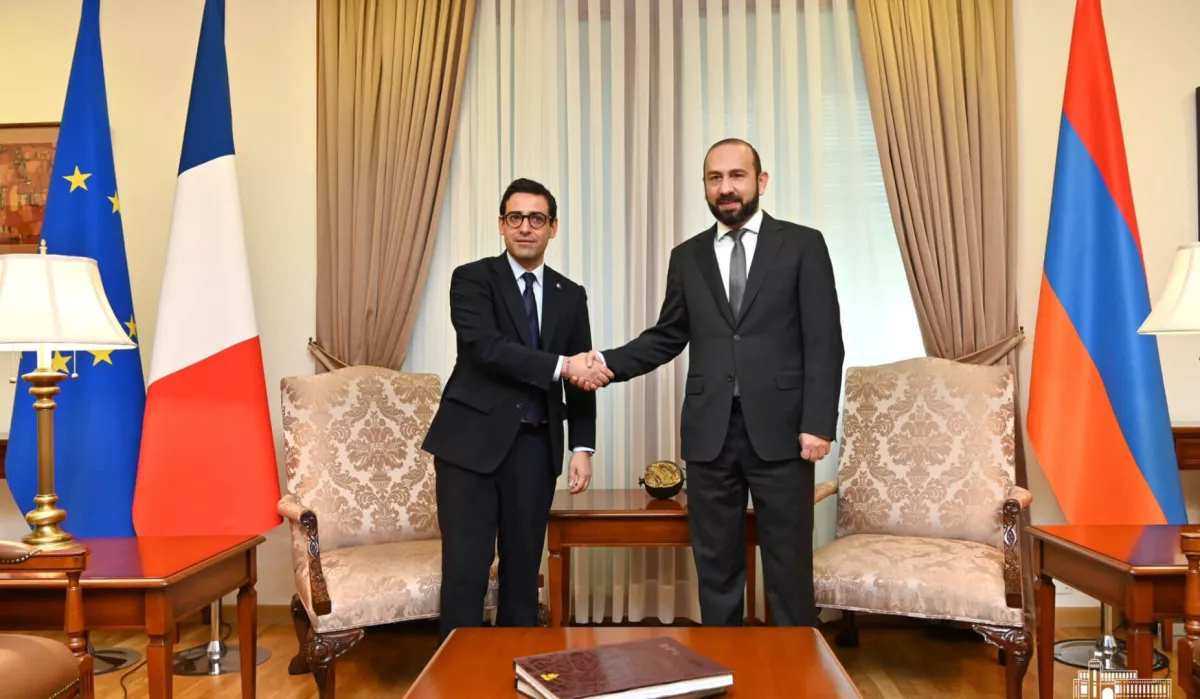France's Séjourné stokes regional discord with support for Armenia Paris’s misguided diplomacy
"Welcome, dear Séjourné!" — this playful twist on a traditional Romani song best captures the enthusiasm with which Armenian society, especially its political elites, welcomed the visit of French Minister for Europe and Foreign Affairs, Stéphane Séjourné, to Yerevan.
Even before his arrival, Séjourné was already boosting Armenian pride with declarations of French solidarity from Paris, calling Armenia a "stronghold of democracy." During his visit to the Armenian capital, he went even further, promising to shield Armenia from "Russian pressure." Emphasizing shared values, Séjourné pledged support for the Armenian people and government "despite threats and clear hostility from Russia."
It’s worth noting that Séjourné’s statement was quite populist, obscuring more than it clarifies about French-Russian relations in the South Caucasus. In practice, the West and Russia manage their interests in Armenia quite harmoniously. After all, why create conflict when common ground is available? Armenia’s role in stirring tensions across the Caucasus benefits all three countries— the former co-chairs of the OSCE Minsk Group. However, it’s also possible that these three partners in Armenia's "dormitory" have their own petty disputes and sometimes undermine each other’s interests with complaints and scandals, not hesitating to stir the pot when it serves their purpose.
Returning to Séjourné’s comments, his most notable remarks were about Azerbaijan. “France supports the prompt signing of an agreement that will establish a just and stable peace, respecting the sovereignty and territorial integrity of both countries. This is the essence of the document signed in Almaty in 1991. The same idea was presented to the public in Prague,” Séjourné remarked, trying to soften a difficult reality.

“France is also supporting the process of delimiting the border between the states based on the same principles. Paris believes that the South Caucasus should become a region of peace and cooperation,” the French diplomat continued, droning on with platitudes, before delivering a stunningly bold remark: “Armenia wants peace. France and the international community want peace. Since Azerbaijan will soon host COP29, it bears the responsibility to demonstrate its sincere desire for peace before the event. I think we should be able to make rapid progress on this issue,” the minister stated.
In other words, this individual seems to want to place the responsibility on Azerbaijan to sign a peace agreement—not just at some indefinite time, but within a strictly set deadline. In short, the French diplomat is issuing an ultimatum. While he didn’t specify what would happen if Azerbaijan doesn’t heed his advice, the implication is that Baku should be alarmed and consider that the patience of the French has worn thin. One might even think that an atomic bomb could be dropped on us from the Mururoa Atoll at any moment.
Backing up the French guest was Armenia’s chief diplomat, Ararat Mirzoyan. “As you know, we have submitted further revisions, including a fully agreed text,” Mirzoyan reminded. “We are ready to sign the agreed text as soon as possible. The treaty in which the countries mutually recognize each other’s territorial integrity, the Almaty Declaration, and the borders that existed at the collapse of the USSR.”
It turns out that merely declaring readiness to sign an agreed text is enough to present oneself as a party willing for peace. To clarify for those who are still not in the loop (but not for Séjourné, who already knows everything)—Armenia’s eagerness to sign a peace agreement based solely on agreed points hides its reluctance to address the fundamental issue for peace: removing from its constitution the provisions that contain territorial claims against Azerbaijan.
Here’s what we’d say to Séjourné: It would be wise for you, Mr. Minister, not to rush into supporting such initiatives. The French enthusiasm in this matter casts a significant shadow of irony over the Fifth Republic. This Franco-Armenian rhetoric is reminiscent of a hypothetical situation where, in 1958, Konrad Adenauer, after securing support from the US, proposed to Paris a treaty with the condition that Berlin would only recognize half of France. You understand the comparison, don’t you? Of course, the situations are not exactly identical (Azerbaijanis, unlike the French, liberated their own land, and Armenians, unlike the Germans, did not conquer theirs), but in a metaphorical sense, the situation feels quite similar.
Behind all these statements, one can easily imagine French diplomats advising their Armenian counterparts: “How about we approach it this way…” However, it's clear that the idea of proposing peace while omitting fundamental issues is more in line with Armenian tactics than French ones. In this absurd and audacious dialogue, the demagogic and guttural Armenian voice stands out more sharply than the subtle, nasal French accent. This indicates that the French advisors lack both the skill and the means to offer their eager protégés a more substantial diplomatic strategy. The fact that the heirs of the brilliant Talleyrand are resorting to such crude tactics suggests they are unable to achieve anything more significant in the diplomatic arena. And that is, in itself, good news.

However, there is some bad news, and it pertains to the military cooperation between France and Armenia. Séjourné was quick to remind us of this, stating that Paris will continue its defense and security collaboration with Yerevan. “Armenia must have the means to defend its territorial integrity and sovereignty, as well as its population,” he said. At the same time, the diplomat hypocritically assured that “the defense cooperation between the two countries is not aimed at escalating tensions in the region—no one has such intentions.”
Here, we need to be especially vigilant. The arming of Armenia, with France as a leading force, poses a constant risk of armed escalation in the region.
Finally, Séjourné announced that France will transfer €29 million to Armenia to “support the forcibly displaced residents of Karabakh.” By doing so, official Paris takes the bold step of perpetuating the falsehood of alleged forced displacement of Armenians from the Karabakh region of Azerbaijan to Armenia. In assisting Armenian refugees, the French further highlight their hypocritical policy of catering to the former aggressor. Throughout the entire period of occupation, not a single cent was provided by the French government for the needs of Azerbaijani refugees and displaced persons.
Paris has taken another step toward confrontation with Baku. Even the United States, known for its direct approach and with greater resources at its disposal, tends to avoid making sharp statements about Azerbaijan. It’s likely that Washington has delegated the role of the “bad cop” to the French, who eagerly embrace it as an opportunity to show off. They certainly understand that this "toughness" doesn’t originate with them, which only fuels their frustration further. It will be all the more amusing to watch Paris’s sour expression if Washington ultimately assesses the situation correctly and decides on a pragmatic course to avoid worsening the situation.
This is always the case when working for someone else’s interests. This is especially true for the Armenians. They are at the very bottom of the food chain in the destabilization game in the South Caucasus and will be the first to be sacrificed in any scenario.
Translated by Vugar Khalilov








